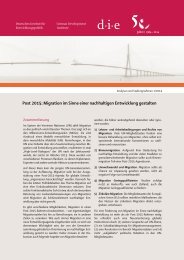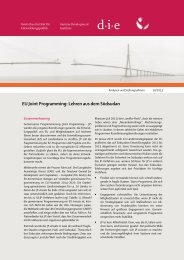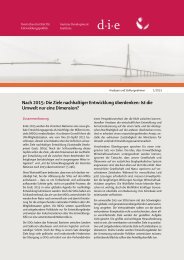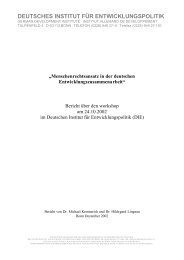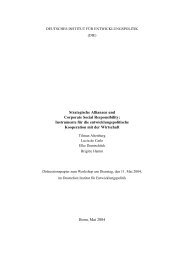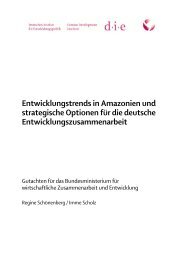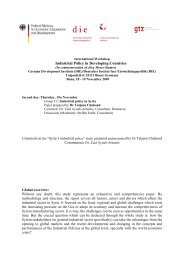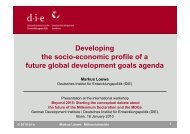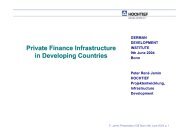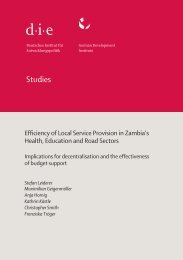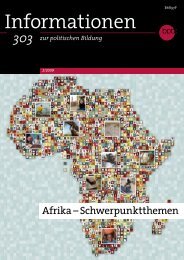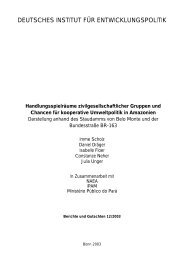Middle East / North Africa and the Millennium Development Goals ...
Middle East / North Africa and the Millennium Development Goals ...
Middle East / North Africa and the Millennium Development Goals ...
You also want an ePaper? Increase the reach of your titles
YUMPU automatically turns print PDFs into web optimized ePapers that Google loves.
68<br />
Markus Loewe<br />
cause all <strong>the</strong>se institutions are made up of men only (like e.g. <strong>the</strong> tribal<br />
councils of elders in Jordan).<br />
The situation is similar for national legislation <strong>and</strong> jurisdiction. In <strong>the</strong> end,<br />
it is national parliaments <strong>and</strong> governments that decide on how best to resolve<br />
<strong>the</strong> above-mentioned tensions between <strong>the</strong> constitutional principle of<br />
equal treatment <strong>and</strong> <strong>the</strong> inclusion in most constitutions in <strong>the</strong> region of a<br />
reference to šarī c a. These institutions must decide whe<strong>the</strong>r or not a law<br />
discriminates against women. At <strong>the</strong> same time, though, <strong>the</strong>se institutions<br />
are composed wholly or chiefly of men. In Yemen, for instance, in 2001<br />
this led to a situation in which a parliamentary committee introduced a bill<br />
which would have authorized <strong>the</strong> police to return back to <strong>the</strong>ir husb<strong>and</strong>s<br />
wives that are living in separation. Conversely, <strong>the</strong> Jordanian parliament<br />
has for years now declined to stiffen penalties for <strong>the</strong> so-called honorkillings<br />
(Würth 2004, 13).<br />
Many courts are also dominated by men. This goes in particular for <strong>the</strong> civil-status<br />
courts of individual religious groups. It is true that only <strong>the</strong> minority<br />
religions (Christians, Jews, Druze) have civil-status courts of <strong>the</strong>ir<br />
own, while <strong>the</strong> official authorities are responsible for Muslims. But <strong>the</strong><br />
members of <strong>the</strong>se courts are as a rule appointed only after consultations<br />
with religious legal scholars <strong>and</strong> tend <strong>the</strong>refore to be made up of men only<br />
(Elsadda 2004; Schirrmacher 2004, 10 ff.).<br />
Finally, women’s access to <strong>the</strong> judiciary is also hampered by <strong>the</strong> latter’s<br />
lack of transparency. Many cases have become known of corruption <strong>and</strong><br />
inequitable enforcement of legal norms <strong>and</strong> court decisions in numerous<br />
countries of <strong>the</strong> region. In addition, women wishing to file a legal suit find<br />
<strong>the</strong>mselves faced with substantial bureaucratic obstacles. And seldom are<br />
<strong>the</strong>re lawyers <strong>and</strong> legal assistant available to aid illiterate persons in filling<br />
out required forms. All this means that recourse to <strong>the</strong> law involves numerous<br />
uncertainties for anyone seeking it. However, <strong>the</strong> persons most in<br />
need of recourse to <strong>the</strong> law are women, since in matters of civil status men<br />
are, in cases of doubt, invariably in <strong>the</strong> stronger position – especially when<br />
it comes to questions of divorce (see Box 1).<br />
German <strong>Development</strong> Institute



